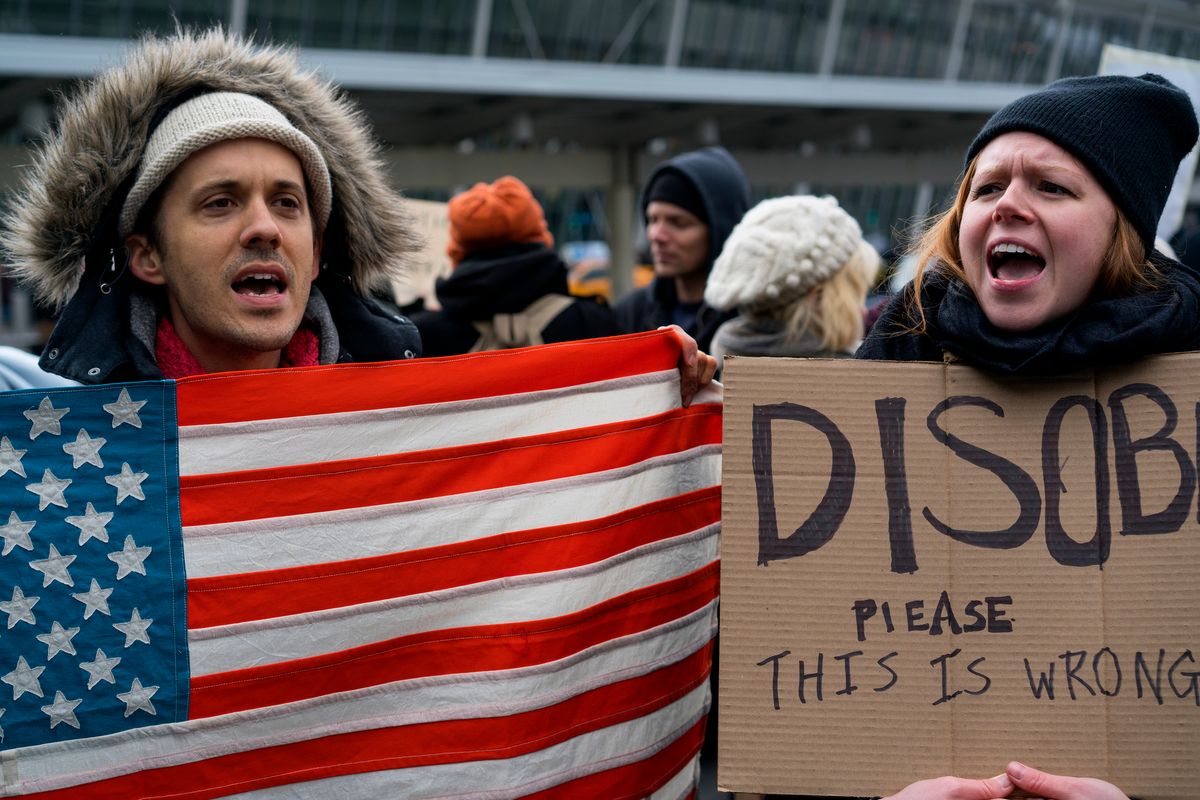The latest battle in the legal war over President Donald Trump's controversial travel ban was broadcast live on cable news stations on Monday. A three-judge panel of the Ninth U.S. Circuit Court of Appeals expressed skepticism about some arguments against the ban, but also pressed the lawyer defending Trump's suspended policy about whether it discriminates against Muslims.
The Ninth Circuit originally blocked Trump’s first travel ban on due process grounds, while the revised version of the ban is currently before a different panel. On Monday the court reviewed the president's appeal of a March decision that put a nationwide hold on his executive order barring entry or visas into the U.S. for nationals of Iran, Syria, Sudan, Libya, Somalia and Yemen for 90 days and blocking all refugees for 120 days. (The revised order removed Iraq from the list of banned nations, makes no mention of religion, exempts green-card holders and allows for exceptions in certain cases.)
[salon_video id="14767043"]
U.S. District Judge Derrick Watson in Hawaii blocked the revised ban in March, citing Trump’s campaign statements calling for a complete and total shutdown of all travel into the U.S. by Muslims. Watson found that the travel ban likely violated the constitution’s Establishment Clause by discriminating against Muslims.
“We shouldn’t start down the road of psychoanalyzing what people meant on the campaign trail,” Acting Solicitor General Jeffrey Wall argued in a Seattle court on Monday. Wall told the judges that they need only determine whether there was a “rational basis” for the president’s travel ban, a lower bar of scrutiny than for an executive order impacting constitutionally protected rights such as freedom of religion.
"This order is aimed at aliens abroad, who themselves don't have constitutional rights," Wall argued. He said the judges should focus on official, unequivocal statements from the White House, not the campaign trail, when evaluating its intent.
But Judge Richard Paez noted that the order that interned Japanese-Americans during World War II was neutrally worded. “There was no reference to Japanese in that executive order,” he said, “and look what happened.”
The Trump administration's lawyer then shockingly admitted he had never read the order that resulted in the landmark Korematsu case. But if Trump's executive order was anything like Korematsu, Wall said: "I wouldn't be standing here, and the U.S. would not be defending it."
During more than an hour of arguments, supporters of immigrants and refugees rallied outside the Seattle courthouse, chanting and carrying "No Ban, No Wall" signs, the Associated Press reported.
Neal Katyal, former acting solicitor general under President Obama, represented the challengers -- the state of Hawaii and a local imam. After a court blocked the revised order, Katyal said, Trump declared the new measure a “watered-down” version of the first.
The three judges — all appointed by former President Bill Clinton — peppered Wall and Katyal with pointed questions.
Judge Michael Daly Hawkins asked if Trump had ever said he was wrong about calling for a Muslim ban on the campaign trail.
“Has he ever said anything approaching that?” Hawkins asked skeptically.
Wall argued that the president had said “several things approaching” a repudiation of his campaign trail comments.
But "he could not actually point to any disavowal,” Katyal later pointed out, "because the truth is there is no such statement."
Katyal went on to argue that even the revised order would hurt the fight against terrorism. By focusing on nationality, Trump’s Muslim ban would bar a Syrian national who had lived in Switzerland for decades but not a Swiss national who had immigrated to Syria during the civil war, the challengers argued.
Hawaii also cited a draft report from the Department of Homeland Security that said citizenship was an “unlikely indicator” of future terrorism and that few individuals from the targeted countries have been involved in terrorism in the U.S.
Fourteen states, including Alabama, Arizona, Montana and Mississippi, have urged the Ninth Circuit to permit enforcement of Trump’s directive.
Last week, judges on the Virginia-based Fourth Circuit Court of Appeals heard arguments over whether to affirm a Maryland judge's similar ruling to put the ban on ice.
The dispute over the travel ban is expected to eventually come before the U.S. Supreme Court, unless the Trump administration wins in both the Fourth and Ninth circuits.



Shares